VR WordPress themes are gaining momentum for a clear reason: they streamline website functionality, enhancing user experience. As more businesses pivot toward this technology, the advantages are evident. They aim to immerse users in product experiences, and your site should follow suit. Enabling customers to visualize purchases or experience services enriches the realm of experiential marketing and elevates the online shopping journey. Given the power held by customers in the realm of shopping, opting for virtual reality themes is a prudent choice. The best part? The complexities have been resolved, simplifying your workflow. Your task lies in selecting the ideal fit among the top virtual reality WordPress themes for your website.
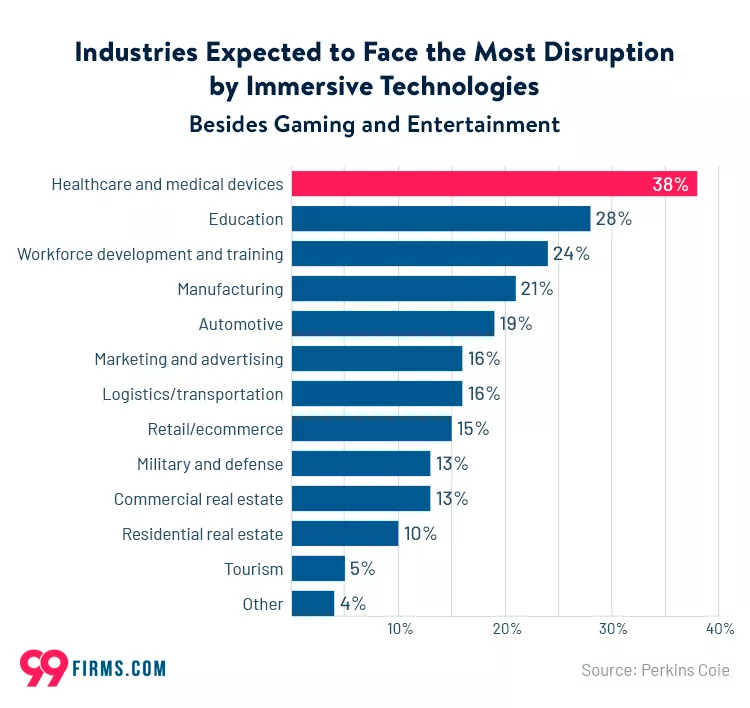
Premium WordPress themes are plentiful in the online marketplace, showcasing diverse designs and styles. Yet, the risk of choosing a theme that doesn’t deliver what it promises is ever-present. The curated collection of virtual reality WordPress themes presented below offers a different perspective. Each option adheres to superior web design standards, ensuring your site is launch-ready in minutes. Moreover, effortless layout customization awaits, sans the need to delve into intricate coding. Robust page builders streamline this process. Integration with WooCommerce facilitates product or service sales directly from your pages. Plus, WPML support enables content translation into multiple languages, widening your audience reach. The array of benefits woven into each option is extensive, inviting you to explore at your own pace.
Virtual Reality (VR) WordPress themes are gaining momentum due to their ability to enhance user experiences and create engaging websites. They cater to various industries and niches, offering features like customization, compatibility with page builders, eCommerce integration, and specialized designs to meet specific needs.
Benefits of Virtual Reality WordPress Themes:
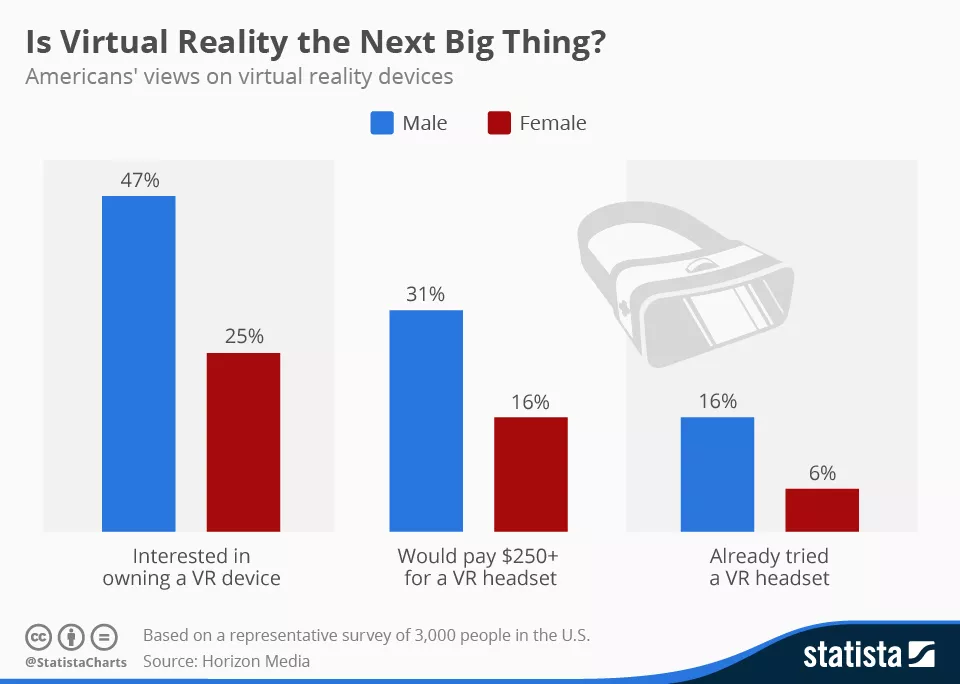
- Engaging User Experience: VR themes offer immersive experiences, aiding in showcasing products, services, or content in an interactive manner.
- Customization: These themes come with a myriad of customization options, allowing users to tailor websites to their preferences without coding skills.
- Industry-specific Designs: Themes cater to niche industries like gaming, cryptocurrency, travel, eCommerce, and blogging, providing tailored templates for these sectors.
- SEO Optimization: Many VR themes adhere to SEO best practices, aiding in better visibility and rankings on search engines.
- eCommerce Integration: Seamless integration with WooCommerce enables users to sell products or services directly through their websites.
Factors to Consider Before Choosing a Virtual Reality WordPress Theme:
- Purpose and Industry Focus: Determine if the theme aligns with your website’s purpose, whether it’s for gaming, eCommerce, blogging, or a specific niche industry.
- Customization and Flexibility: Assess the theme’s flexibility in terms of customization options, layout variations, and compatibility with page builders like Elementor or Gutenberg.
- Performance and Speed: Prioritize themes optimized for speed and performance, ensuring a smooth user experience.
- SEO Readiness: Check if the theme follows SEO best practices to boost visibility on search engines and improve organic traffic.
- Plugin Compatibility: Ensure compatibility with essential plugins like WooCommerce, GDPR Compliance, Contact Form 7, or others required for your website’s functionality.
- Support and Documentation: Evaluate the availability of customer support, regular updates, and comprehensive documentation for easier troubleshooting.
TOP VR Themes for WordPress:
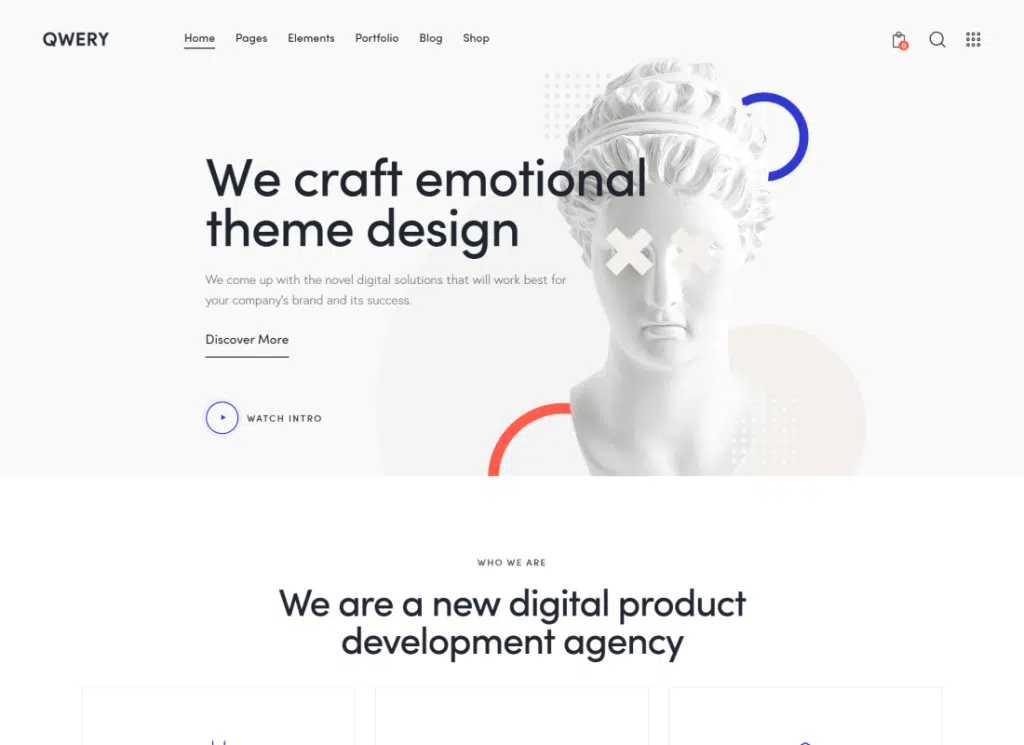
Qwery stands tall among virtual reality WordPress themes, offering premium functionality catering to diverse skill levels. It’s a versatile option suitable for novices and experts alike. The theme boasts an extensive array of customization options, providing over sixty ready-made website concepts as a launchpad for your portal’s creation. Whether you seek enhanced site development or aim for a robust digital presence, Qwery delivers.
Developed with Elementor, a leading code-free page builder, Qwery prioritizes performance, ensuring swift page load speeds. Additionally, it complies with top SEO standards, empowering your content for SERP dominance. Flexible booking options, customizable header & footer layouts, and slider creation amplify your site’s potential. Its full WooCommerce integration enables seamless online product or service sales, with a responsive layout optimized for various mobile devices, ensuring a differentiated value proposition in the online shopping experience.
- Pros: Extensive customization options, swift page load speeds, robust SEO adherence, versatile booking features, and seamless WooCommerce integration.
- Cons: Limited information on pricing, requires exploration for optimal utilization.
- Major Industries: Businesses of diverse scales, corporate entities, e-commerce ventures.
2. Gamic
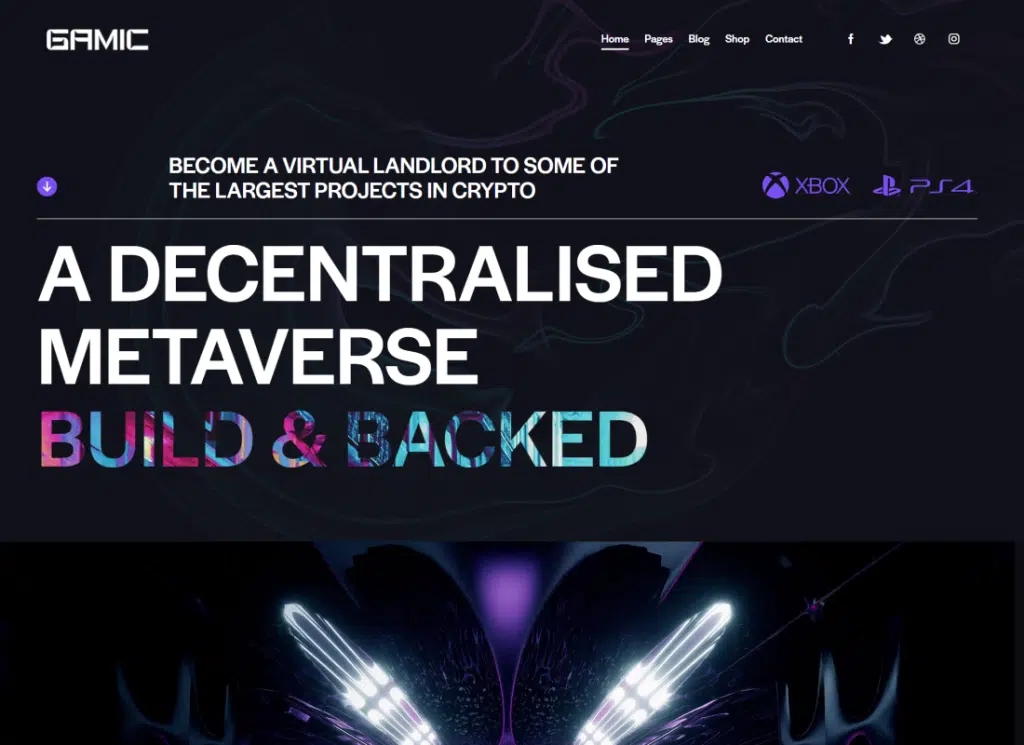
Gamic, a standout among virtual reality WordPress themes, caters to the gaming and cryptocurrency niches, ideal for ICO, investment, NFT, or blockchain websites. With seven creative pre-designed demos, Gamic simplifies site creation, facilitating easy portal development without coding intricacies.
Boasting full WooCommerce integration and elegro Crypto Payment support, Gamic enables diverse sales, from gaming accessories to NFTs, bolstered by clean HTML code optimized for SEO practices. Its WPBakery page builder streamlines site development for users of varying skill levels, ensuring a responsive layout optimized for Retina screens and seamless growth potential for businesses. Additional perks include MailChimp integration, Newsletter Pop-ups support, and GDPR Compliance for data safety.
- Pros: Full WooCommerce integration, cryptocurrency payment support, SEO-optimized code, user-friendly page builder, and robust plugin support.
- Cons: Limited language support, may require familiarity with specific plugins
- Major Industries: Gaming, cryptocurrency, investments, and blockchain services.
3. Revirta
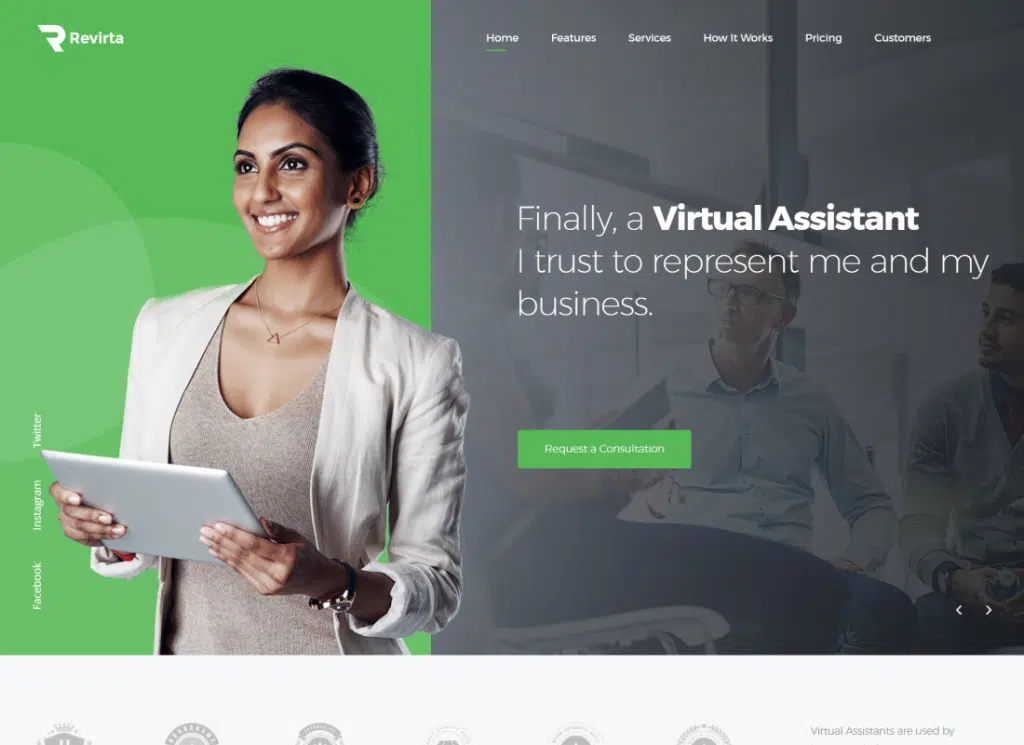
Revirta caters to virtual personal assistants or advisors, offering flexibility and ease of use, featuring six pre-designed homepage styles. The WPBakery page builder ensures smooth site development, even for first-time users, with a clean and responsive layout optimized for Retina screens.
Crafted for both small and large-scale businesses, Revirta provides multiple contact forms, CV functionality, and twelve new widgets. Its switch-to-Gutenberg feature offers editing flexibility, complemented by GDPR Compliance for data safety.
- Pros: Multiple homepage styles, user-friendly page builder, diverse functionality for assistants, and GDPR Compliance.
- Cons: Limited language support, reliance on specific page builder, potential learning curve.
- Major Industries: Remote administrative support, virtual assistants, advisory services.
Learn about wordpress themes for graphic designers here.
4. Hoverex

Hoverex emerges as a robust choice for cryptocurrency websites, incorporating an NFT shop demo and offering bilingual support in English and Spanish. Its video background demo and special crypto plugins enhance storytelling and ICO features, respectively.
Featuring compatibility with LearnPress and donation functionality, Hoverex is equipped with advanced crypto charts, GDPR Compliance, and interactive Ajax functions, promoting data-safe pages and enhanced user engagement.
- Pros: NFT shop demo, bilingual support, advanced crypto features, GDPR Compliance, and interactive Ajax functionality.
- Cons: Limited language support, specialized features may require familiarity.
- Major Industries: Cryptocurrency, NFTs, ICOs, and blockchain services.
5. Ludos Paradise
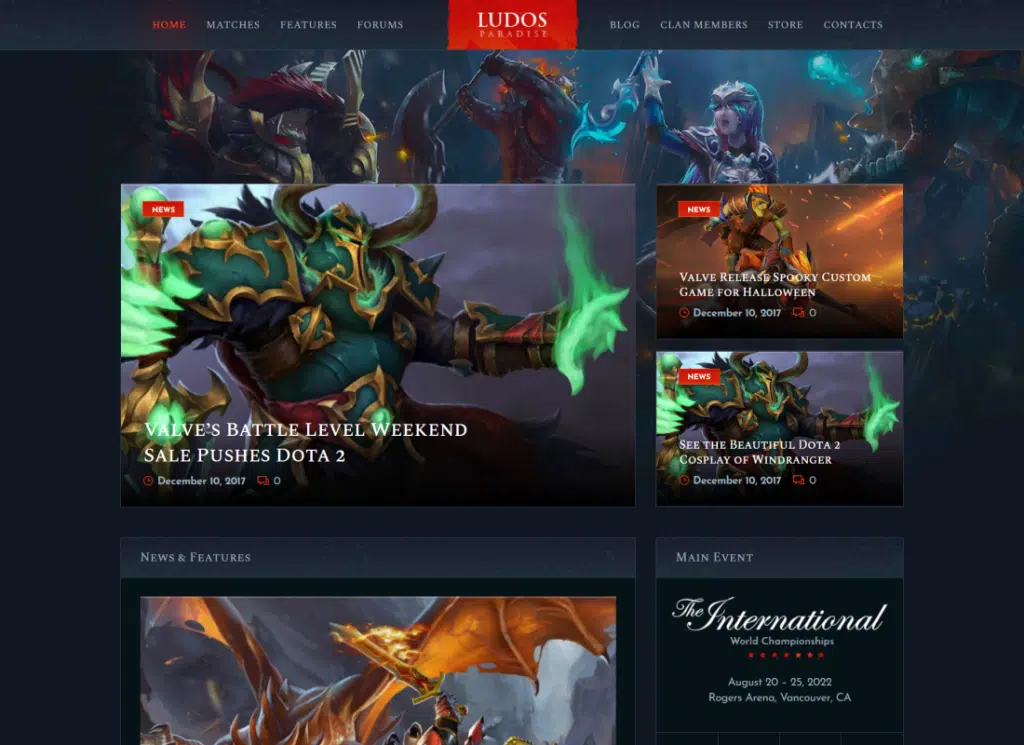
Ludos Paradise caters to gaming enthusiasts, offering live streams, tournaments, and integrated forums via bbPress and BuddyPress plugins. Featuring support for Contact Forms 7, Essential Grid, and WooCommerce, it enables the sale of products or services, while maintaining an engaging gaming-centric design.
- Pros: Live streams & tournaments, integrated forums, WooCommerce support, and diverse gaming features.
- Cons: Gaming-specific features may limit broader applications, potential learning curve for non-gaming users.
- Major Industries: Gaming, eSports, forums, and entertainment.
6. Kicker
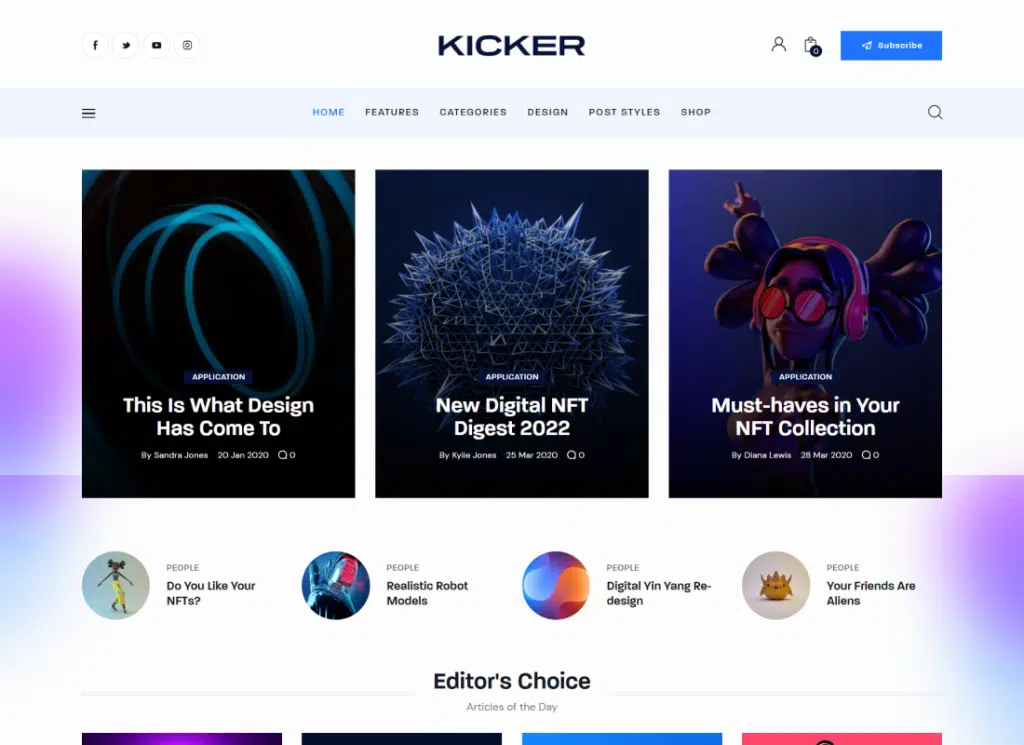
Kicker offers lightning-fast performance with AMP technology, providing an array of pre-designed homepage styles and Gutenberg blocks. Its WooCommerce integration, translation-readiness, and Newsletter Pop-up support make it a versatile solution for various content niches.
- Pricing: Available on request
- Pros: Lightning-fast performance, diverse homepage styles, WooCommerce integration, and Gutenberg compatibility.
- Cons: Potential need for Gutenberg familiarity, limited details on pricing.
- Number of Downloads: Not specified
- Major Industries: Blogging, magazines, multi-content niches.
7. Hobo
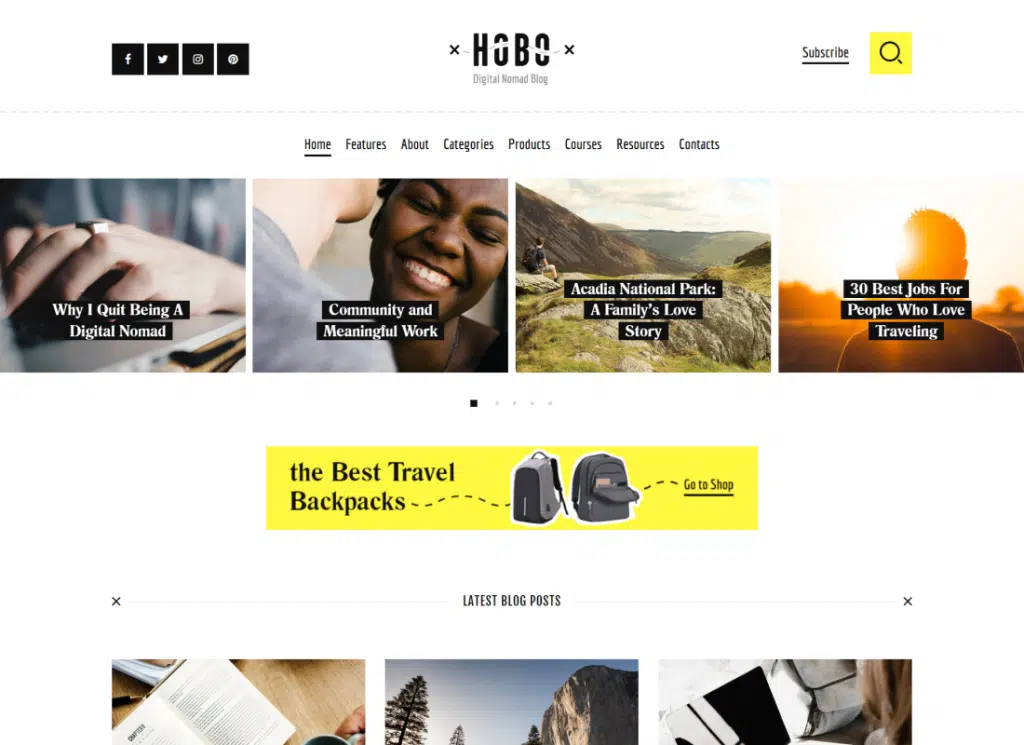
Hobo targets digital nomads, offering a responsive layout with ample white space, perfect for travel blogs, lifestyle news, or magazines. Equipped with Elementor, WooCommerce compatibility, and Search & Filter support, Hobo facilitates easy blogging and product/service sales.
- Pros: Responsive design, ample white space, Elementor compatibility, WooCommerce support, and search/filter functionality.
- Cons: Niche-specific design may limit broader applications, potential need for WooCommerce familiarity.
- Major Industries: Travel blogging, lifestyle news, magazines, and entertainment.
8. Ozisti
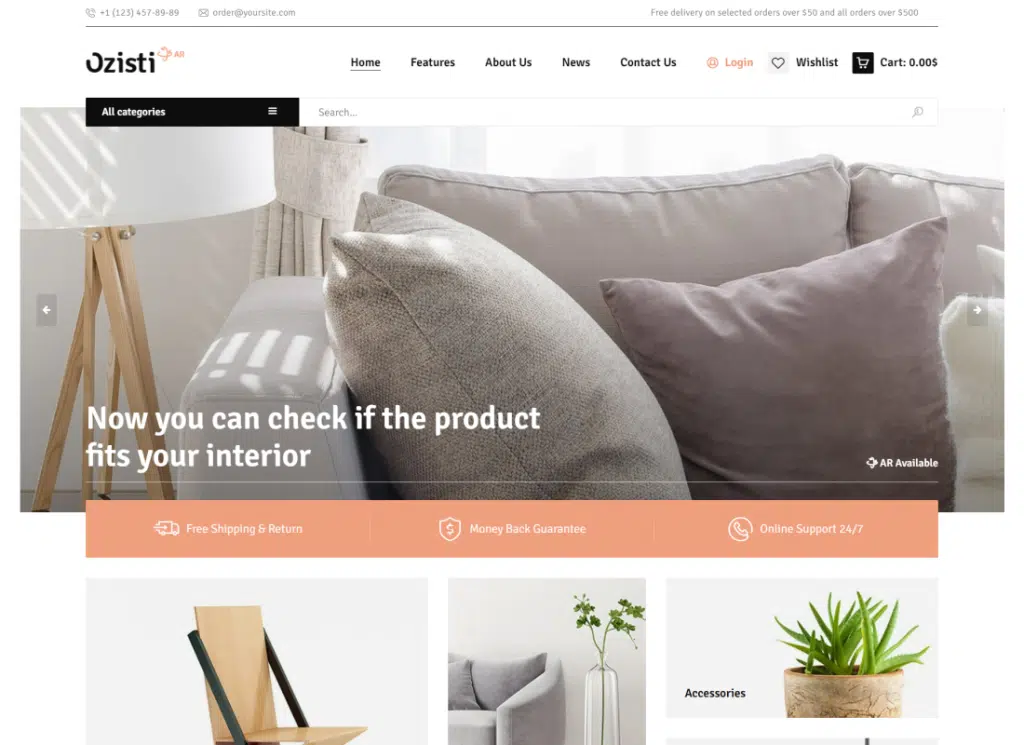
Ozisti stands out with Augmented Reality integration, offering four homepage styles and online currency switcher support. With nine pre-made blog post designs and translation-readiness, Ozisti caters to diverse business requirements, enhancing the user experience.
- Pros: Augmented Reality integration, multiple blog post designs, online currency switcher, and translation readiness.
- Cons: Specific features may require familiarity, potential learning curve for new users.
- Major Industries: E-commerce, online retail, augmented reality integration.
9. Netmix
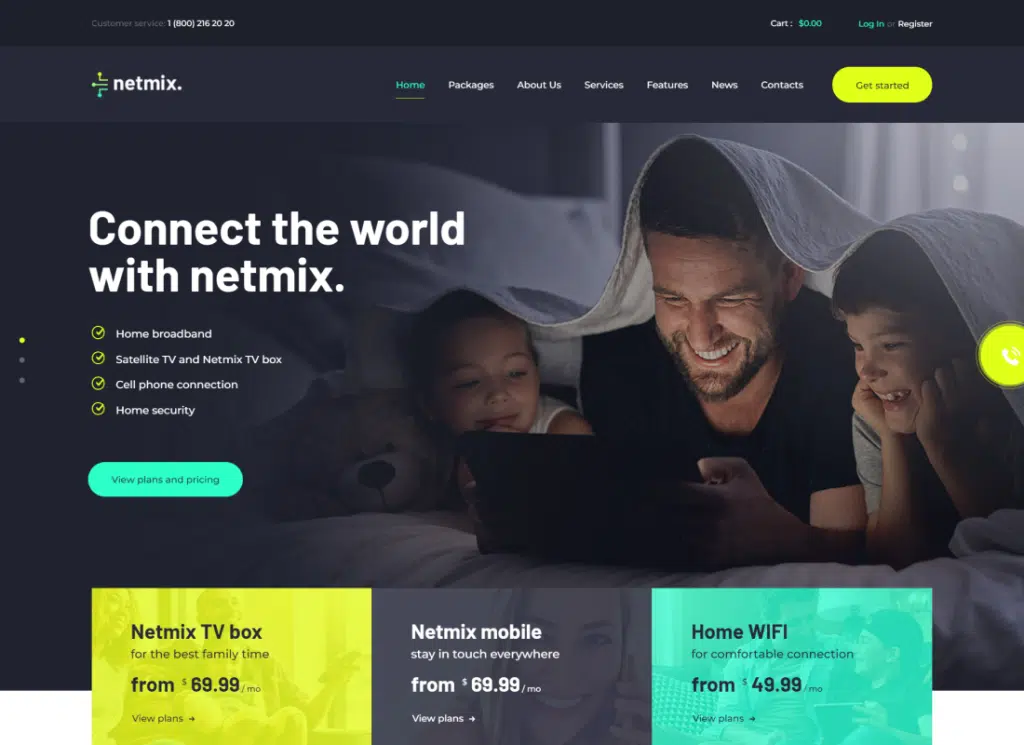
Netmix is tailored for broadband, telecom, and internet providers, featuring a clean design, Elementor compatibility, and premium plugin support such as WooCommerce, Essential Grid, and GDPR Compliance. Its user-friendly interface facilitates hassle-free site development.
- Pros: Industry-specific design, Elementor compatibility, WooCommerce support, and premium plugin integration.
- Cons: Industry-specific focus may limit broader applications, potential need for specific plugin familiarity.
- Major Industries: Broadband, telecom, internet services, and cable television.
10. Piqes
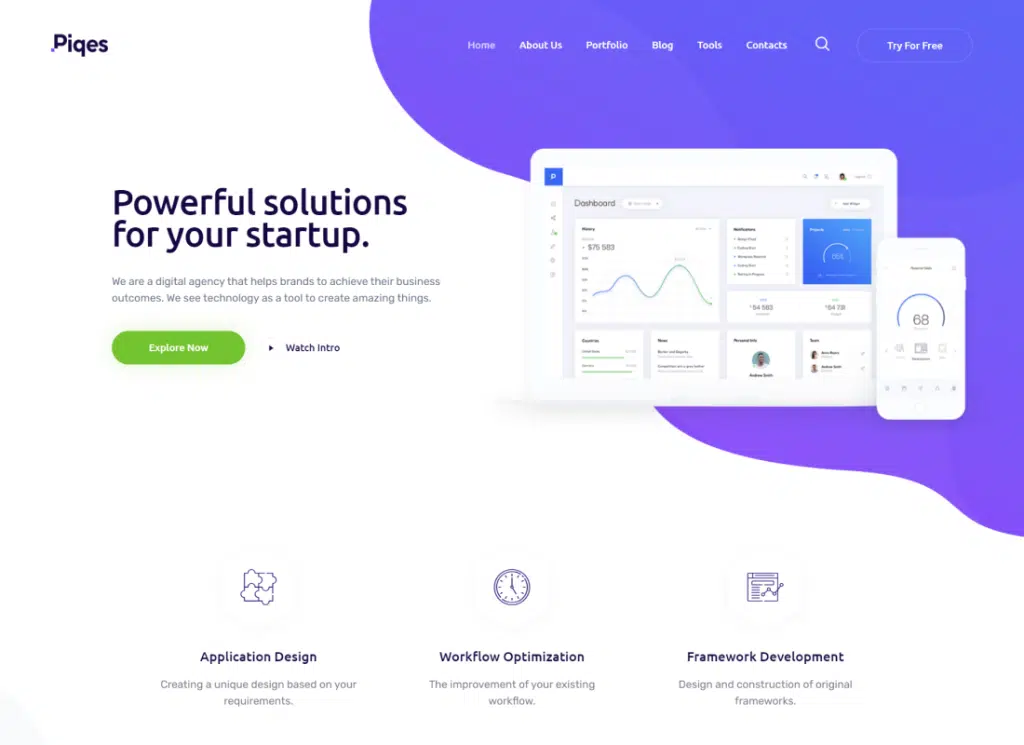
Piqes caters to creative professionals, offering a stylish design, custom shortcodes & widgets, and support for Essential Grid, Contact Form 7, and GDPR Compliance. Its WooCommerce readiness and drag-and-drop page builder empower users to craft unique digital agency sites.
- Pros: Stylish design, custom shortcodes/widgets, WooCommerce support, and GDPR Compliance.
- Cons: Niche-specific design focus, potential need for WooCommerce familiarity.
- Major Industries: Creative agencies, web studios, digital design, and marketing firms.
Conclusion:
Virtual Reality has made significant strides in entertainment, education, healthcare, and business. Its immersive capabilities have revolutionized how we interact with digital environments and created new opportunities for innovation. VR has proven to be more than just a gaming tool; it’s a medium that fosters empathy, enhances learning experiences, facilitates training simulations, and enables remote collaboration. As technology continues to evolve, VR is poised to become even more accessible, affordable, and integrated into our daily lives.
FAQs on Virtual Reality Themes:
Are there any studies or research supporting the educational benefits of VR?
Research indicates that VR enhances engagement, knowledge retention, and critical thinking skills. Studies have shown its effectiveness in fields like STEM education, language learning, and medical training by providing experiential learning opportunities.
What measures are in place to ensure VR experiences are inclusive?
Efforts include designing accessible interfaces, providing options for various disabilities (e.g., auditory or visual impairments), and advocating for inclusivity in VR content creation.
How does VR blur the lines between reality and virtual experiences, and what implications does this have?
The immersive nature of VR raises concerns about psychological impacts, desensitization to real-world experiences, and the potential for addiction or disassociation from reality.



